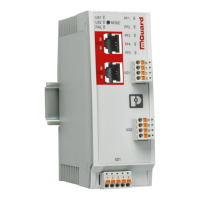
Do you have a question about the Phoenix Contact FL MGUARD 1000 Series and is the answer not in the manual?
| Protection Class | IP20 |
|---|---|
| Product Series | FL MGUARD 1000 Series |
| Category | Industrial Equipment |
| Power Supply | 24 V DC (typically 12-48 V DC range) |
| Network Interfaces | Ethernet |
| Number of ports | 2 |
| Configuration | Web-based, CLI |
| VPN protocols | IPsec |
Explains symbols used for warnings and potential damage.
Details conventions used in the manual, like bold and italic text.
Specifies the target audience and required expertise for using the manual.
Defines the purpose and application of the FL MGUARD 1000 series devices.
States that hardware and firmware modifications are not permitted.
Provides essential safety precautions for installation, operation, and maintenance.
Outlines measures for protecting components, networks, and systems against unauthorized access.
Directs users to find the latest security advisories and information.
Provides information on how to obtain additional support and assistance.
Describes the device's function as a router/gateway connecting subnets.
Highlights the mGuard Security Technology integrated for network security.
Explains how vulnerabilities are managed and addressed by the PSIRT team.
Provides a summary of the device and its order number.
Lists the items included with the device delivery and how to check them.
Details the specific features, connections, and operating elements of the FL MGUARD 1102.
Explains the meaning of various LEDs on the device for status and diagnostics.
Describes the status indicated by the PF1-PF5 LEDs during operation and firmware updates.
Explains the LNK/ACT and SPD LEDs related to network connection status and speed.
Details the US1 and US2 LEDs indicating the status of the device's power supply.
Explains the meaning of the FAIL LED for system errors and device restarts.
Describes the initial network interface configuration and user access settings.
Outlines the default IP addresses, net mask, and gateway for network interfaces.
Specifies the default username and password for accessing the device.
Lists network services like DHCP, DNS, and NTP that are active by default as clients.
Lists services like Web server, RESTful server, SNMP that are active by default as servers.
Details the firewall rules for incoming and routed data traffic.
Provides instructions on how to securely mount and remove the device from a DIN rail.
Explains how to safely connect the 24 V DC power supply using the COMBICON connector.
Details the importance and methods for grounding the device to prevent interference.
Guides on connecting the device to the network using RJ45 Ethernet ports.
Specifies pin assignments and cable requirements for RJ45 Ethernet connections.
Describes how to connect digital inputs and outputs via COMBICON connectors.
Explains the location and usage of the SD card holder for storage.
Lists the necessary components for device startup.
Details how to operate the device in Easy Protect Mode for automatic network protection.
Step-by-step instructions to activate the Easy Protect Mode by bridging contacts.
Explains how to connect devices to be protected using net zone 2.
Guides on operating the device as a gateway between different subnets.
Describes the process of starting the device in router mode and its LED indications.
Explains how to connect a configuration computer to the device for setup.
Details using an SD card to save and import device configurations for quick setup.
Provides instructions on accessing and logging into the device's web interface.
Lists the web browsers compatible with the device's management interface.
Identifies the user roles authorized to access the web-based management.
Step-by-step guide to log into the web-based management interface.
Explains the methods for restarting the device, either via the Mode button or power interruption.
Introduces the RESTful API for configuring the device, aimed at experienced users.
Lists the four available smart mode functions for device configuration.
Describes the function to exit smart mode without applying any changes.
Explains how to reset the IP configuration to restore access to the device.
Details the process to securely delete configuration, passwords, and certificates.
Guides on updating the device firmware using an SD card without management access.
Explains how to activate, select, and execute smart mode functions during device boot.
Provides steps to activate smart mode by pressing the Mode button after starting the device.
Describes how to navigate through smart mode functions using the Mode button.
Details the process to execute a selected smart mode function.
Instructions for securely deleting data before decommissioning to protect privacy.
Steps for replacing a faulty device with an identical one.
Guidelines for sending defective devices back for repair or replacement.
Advice on how to dispose of the product and packaging materials responsibly.
Lists the detailed technical specifications for the FL MGUARD 1102 device.